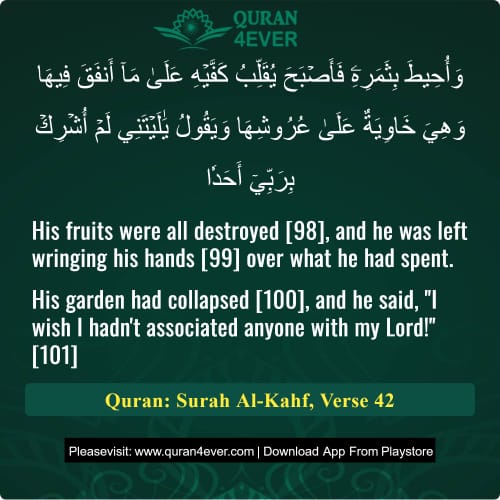
Transliteration:( Wa uheeta bisamarihee faasbaha yuqallibu kaffaihi 'alaa maaa anfaqa feehaa wa hiya khaawiyatun 'alaa 'urooshihaa wa yaqoolu yaalaitanee lam ushrik bi Rabbeee ahadaa )
"His fruits were all destroyed [98], and he was left wringing his hands [99] over what he had spent. His garden had collapsed [100], and he said, 'I wish I hadn't associated anyone with my Lord!' [101]"
This means that everything happened just as foretold by the believer — a lightning bolt or a heavenly calamity struck the fruit-laden trees, reducing the entire garden to ashes. From this we learn that ingratitude can cause even blessed wealth to be ruined.
Due to intense regret, he began rubbing his hands — a common gesture of grief. This includes actions like biting fingers or sucking the palm, reflecting his emotional collapse.
The grapevines collapsed, the date trees were uprooted, and the garden became so ruined that no amount of water or effort could revive it.
His words, “I wish I hadn't associated anyone with my Lord!” indicate true regret and repentance. Although it's not explicitly stated whether his repentance was accepted or his garden restored, the context suggests that repentance was accepted, but the garden was not returned, as made clear in the following verse.
42. So his fruits were encircled (with ruin). And began Yuqallibu his hands over what he had spent upon it, while it was all destroyed on its trellises, and he could only say: “Would that I had ascribed no partners to my Lord!” 43. And he had no group of men to help him against Allah, nor could he defend (or save) himself. 44. There (on the Day of Resurrection), Al-Walayah will be for Allah (Alone), the True God. He (Allah) is the best for reward and the best for the final end.
Allah says:
(So his fruits were encircled), meaning his wealth, or according to the other opinion, his crops. What is meant is that what this disbeliever was afraid of and what the believer had terrified him actually had happened. A storm struck his garden, a garden which he had erroneously thought would last forever, distracting him from thoughts of Allah, may He be glorified.
(And he began Yuqallibu his hands over what he had spent upon it,) Qatadah said: “He was clasping his hands together in a gesture of regret and grief for the wealth he had lost.”
(and he could only say: “Would that I had ascribed no partners to my Lord!” And he had no group of men) meaning a clan or children, as he had vainly boasted,
(to help him against Allah, nor could he defend himself. There, Al-Walayah will be for Allah, the True God.) Here there are differences in recitation. Some of the reciters pause at the word there,
(nor could he defend himself there. ), i.e., at that time, when Allah sends the punishment upon him, there will be no one to save him. Then they start the next phrase with Al-Walayah;
(Al-Walayah will be for Allah, the True God.) Some of them pause at the phrase
(nor could he defend himself) and start the next phrase;
(There, Al-Walayah will be for Allah, the True God.) There is a further difference in the recitation of the word Al-Walayah. Some read it as Al-Walayah, which gives the meaning that all allegiance will be to Allah, i.e., on that Day everyone, believer or disbeliever, will return to Allah, for allegiance and submission to Him when the punishment comes to pass. This is like the Ayah:
(So when they saw Our punishment, they said: “We believe in Allah Alone and reject (all) that we used to associate with Him as partners.”) ﴿40:84﴾ and Allah says concerning the Fir`awn;
(Till when drowning overtook him, he said: “I believe that none has the right to be worshipped but He in Whom the Children of Israel believe, and I am one of the Muslims.” Now! While you refused to believe before and you were one of the mischief-makers.) ﴿10:90-91﴾ Some others read it as Al-Wilayah, meaning that on that Day the rule will belong to Allah, the True God. Some read Haqqu (True) refering to Al-Wilayah, as in the Ayah;
(The sovereignty on that Day will be the true (sovereignty), belonging to the Most Gracious (Allah), and it will be a hard Day for the disbelievers) ﴿25:26﴾. Others it read Haqqi referring to Allah, may He be glorified, as in the Ayah:
(Then they are returned to Allah, their True Protector.) ﴿6:62﴾ So Allah says:
(He (Allah) is the best to reward and the best for the final end.) for deeds that were done for the sake of Allah, their reward is good and their consequences are all good.
(18:42) Eventually all his produce was destroyed and he began to wring his hands in sorrow at the loss of what he had spent on it, and on seeing it fallen down upon its trellises, saying: “Would I had not associated anyone with my Lord in His Divinity.”
There is no commentary by Abul Maududi available for this verse.
[789]- He attributed his prosperity to himself rather than to Allāh and disbelieved in the account of the Hereafter.

For a faster and smoother experience,
install our mobile app now.
Related Ayat(Verses)/Topics